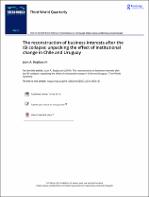JavaScript is disabled for your browser. Some features of this site may not work without it.
Mostrar el registro sencillo del ítem
The reconstruction of business interests after the ISI collapse: unpacking the effect of institutional change in Chile and Uruguay
| dc.contributor.author | Bogliaccini, Juan Ariel | |
| dc.date.accessioned | 2021-02-25T21:33:41Z | |
| dc.date.available | 2021-02-25T21:33:41Z | |
| dc.date.issued | 2019 | |
| dc.identifier.uri | https://hdl.handle.net/10895/1452 | |
| dc.description.abstract | This paper focuses on understanding the different evolutions of business’ associational paths in post-Import Substitution Industrialization (ISI) Chile and Uruguay, offering an explanation at the crossroads of the institutional change and international trade literatures. The argument is that the different forms in which ISI institutions were transformed during the liberalisation period facilitated a greater mobility of factors to different degrees, triggering divergent enduring associational strategies on the part of business. The proliferation of narrow-based special benefits during the ISI fuelled preferences for the formation of sector- based coalitions oriented towards rent-seeking activities. Nevertheless, while ISI regulations were displaced in Chile during the military period, Uruguay followed a gradual process of layering of new rules alongside old ones. These diverging strategies, having different effect on established inter-sectoral regulatory distortions, propitiated alternative associational paths of local business. | es |
| dc.description.sponsorship | Agencia Nacional de Investigación e Innovación FCE_1_2017_1_135444 | es |
| dc.language.iso | en | es |
| dc.publisher | Taylor & Francis | es |
| dc.title | The reconstruction of business interests after the ISI collapse: unpacking the effect of institutional change in Chile and Uruguay | es |
| dc.type | Artículo | es |
Ficheros en el ítem
Este ítem aparece en la(s) siguiente(s) colección(ones)
-
Artículos [51]


